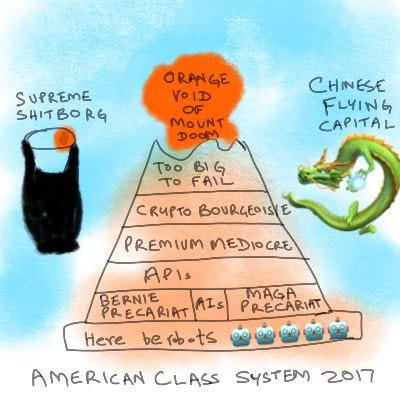The Humanality Project, ep.3
Exploring the intersection of religion, technology and global affairs.
Hey Friends,
Welcome back to the Humanality newsletter where we explore the intersection of religion, technology and global affairs.
For the last few weeks, I’ve been thinking a lot about how and why wellness culture has suddenly appeared (seemingly) everywhere. (think: juice cleanses, goop, yoga retreats, corporate wellness, meditation apps, nutrition supplements).
I’ve been asking myself: how did this shift in consciousness happen? what are it’s philosophical roots, its economics? Does this movement truly indicate that the Western world is undergoing some sort of moral / spiritual elevation or is it just the new model of branding capitalism?
For the next few weeks, I’m going to be writing on this subject and publishing some longer essays that dig into it. It feels like a lot of us are having these kinds of discussions, so if you feel that someone might be interested in joining in the conversation, please take a second to share the newsletter.
I appreciate your support.
Department of Nu-Religion
🖖 The long history of hating on ‘woo’. An interesting take on the meaning of wellness, this article argues that the hatred of Goop—and ‘woo’ more generally—should be seen as the legacy of a scientific materialist ideology that makes it difficult to admit to the existence of things unproven by hard science.
“Peer-reviewed, lab-generated, randomized, controlled, double-blinded evidence will always be the gold standard, but such studies aren’t always fundable, or ethical. We kiss our children’s boo-boos even though there’s no gold standard evidence that it will make them feel better. We just know that it does. Which in turn makes us feel better. That’s “wellness.”
🖖 The Buddhist Ethic and the Spirit of Capitalism. Whatever you think of Zizek, this take on the reasons that Buddhism has become the de-facto philosophy of Western capitalism is fascinating.
Things simply move too fast, and before one can accustom oneself to an invention, it has already been supplanted by a new one, so that one more and more lacks the most elementary “cognitive mapping.” The recourse to Taoism or Buddhism offers a way out of this predicament that definitely works better than the desperate escape into old traditions. Instead of trying to cope with the accelerating rhythm of techno-logical progress and social changes, one should rather renounce the very endeavor to retain control over what goes on, rejecting it as the expression of the modern logic of domination. One should, instead, “let oneself go,” drift along, while retaining an inner distance and indifference toward the mad dance of accelerated process, a distance based on the insight that all this social and technological upheaval is ultimately just a non-substantial proliferation of semblances that do not really concern the innermost kernel of our being.
Department of Global Affairs
🌏 How Technology Strengthens Autocracy. Contrary to early beliefs about how the internet and social media could be used to thwart autocracy, new technology is making it easier for dictators to detect instances of revolt, and crack-down harder and more effectively. This article provides a breakdown of how and why that’s happening.
Surveillance powered by artificial intelligence (AI), for example, allows despots to automate the monitoring and tracking of their opposition in ways that are far less intrusive than traditional surveillance. Not only do these digital tools enable authoritarian regimes to cast a wider net than with human-dependent methods; they can do so using far fewer resources: no one has to pay a software program to monitor people’s text messages, read their social media posts, or track their movements.
🌏 Locusts, Climate Change, and Geopolitics . You may or may not be aware that there is a locust swarm of biblical proportions moving across the Horn of Africa right now. What you probably don’t know is how mono-cropping, the conflict in Libya, and rising global temperatures have conspired to create this issue. If you haven’t read about this topic yet this is a great place to start.
Department of the Techno-State
🕹Premium Mediocre and the Millennial Predicament. This article was definitely my favourite read of the last few weeks—a poignant, hilarious, accurate depiction of the American class system featuring such concepts as:
(1) ‘Precariats’— a portmanteau combining ‘precarious’ and ‘proletariat’. A social class characterized by precarious economic options.
(2) Premium Mediocre—Premium mediocre is the finest bottle of wine at Olive Garden. Premium mediocre is cupcakes and froyo. Premium mediocre is “truffle” oil on anything (no actual truffles are harmed in the making of “truffle” oil), and extra-leg-room seats in Economy. Premium mediocre is cruise ships, artisan pizza, Game of Thrones, and The Bellagio.
If you read one thing this week let this be it.

🕹Can we have prosperity without growth? As the voices of the climate crisis continue to increase their volume, people are looking for new models of economic organization that do not require the push for perpetual growth. Starting with a a history of this economic orthodoxy, this article considers what a post-growth or slow-growth society might look like—and whether we can decouple prosperity, the environment and economic growth.
That’s all for today folks. Until next time—
Sam

